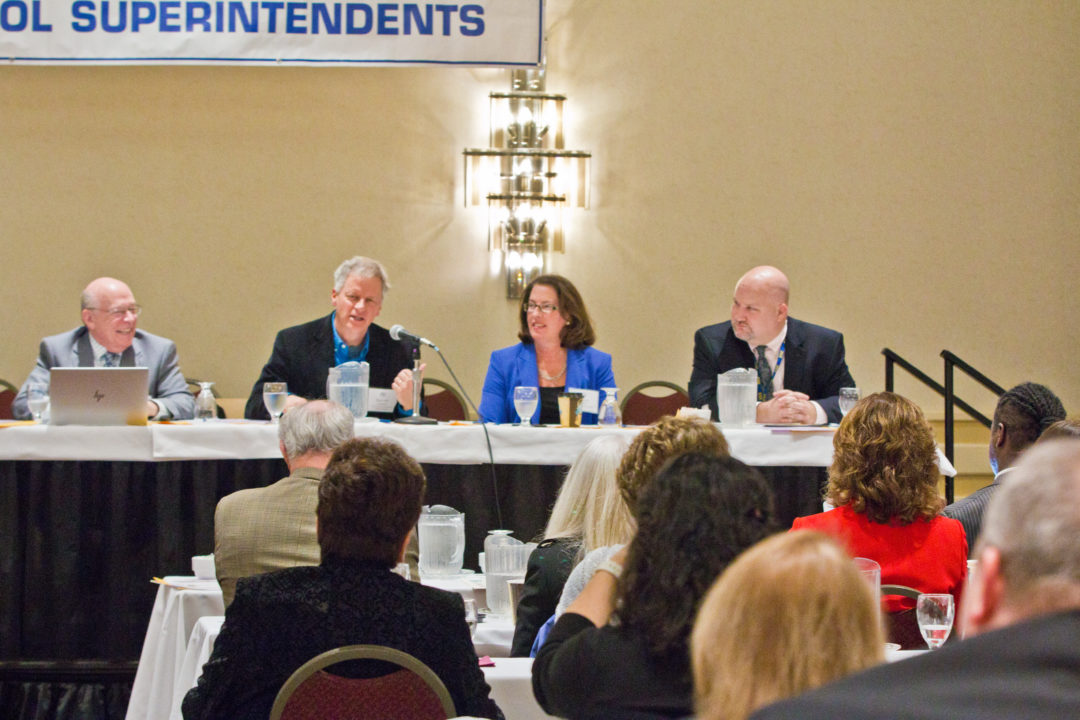
LJeffrey Riley asked the crowd of educational leaders who gathered at this year’s Massachusetts Association of School Superintendents “Mid-winter Meeting” to think back to their earliest memory from their years of schooling.
Was it a happy moment? For Riley, commissioner of Mass. Elementary and Secondary Education, it was not. Chuckling now, as he recounted the memory years later, Riley said he recalled being in 1st-grade when a teacher yelled at him for coloring in a shape with the “wrong” color on an assignment. In hindsight, Riley – and the rest of the superintendents in the room at the meeting held in Marlborough – took humor in Riley’s defiance, but also saw the missed opportunity here with teaching.
“There’s a difference between compliance and enlisting people in the work,” Riley said.
“We know that if kids are excited to learn, that’s the highest form of learning that can happen in the classroom,” he said.
Superintendents from across the state gathered at the Best Western Royal Plaza Hotel & Trade Center in Marlborough to discuss and learn more about ways to engage students in learning that translates well outside the classroom – providing sustainable and truly relevant lessons, project-based opportunities and personalized education to enrich the “whole child.”
While Mass. students lead the country in National Assessment of Educational Progress (NAEP) scores, school officials said the 21st-century requires, “deeper, broader competencies of its high school graduates.”
Andrew Calkins, director of Next Generation Learning Challenges, presented resources, testimonials, videos and general feedback to M.A.S.S. members as a result of his work traveling around the country implementing best practices at schools and seeing dramatically improved results.
He told superintendents to better educate and inspire all students, it would require five steps: Redefine success, transform learning, imagine the change, fully enlist community and “inspire collective will.”
Following his presentation, M.A.S.S. members and panelists Supt. Sheldon Berman of Andover Public Schools, Supt. Dianne Kelly of Revere Public Schools, Supt. Anna Nolin of Natick Public Schools,
Riley and Calkins himself discussed how to establish these steps in schools.
Berman said this would be a collective journey to ensure personalized learning is done well while paying special attention to social justice, equity, complex learners and social learning and responsibility.
“We resonate with those words and that commitment,” he said, noting many school districts with mission statements that directly address the “whole child.”
Nolin said there are many tools already in place to see strong 21st-century learning and teaching come to fruition, but added that meant commiting to re-defining student success.
That, she said, will require, “re-educating the adults about how to experience learning as it is today, and then provide those experiences for kids.”
Educator training, collaboration and support amongst all school personnel, she said, is a must.
Calkins said, “most authentic learning” happens when students feel a sense of belonging, autonomy and engagement combined.
Calkins said, “Everyone needs to feel that they’re part of a pilot … unless you’re willing to change the fundamentals of the process, you’re not doing much.”
“When done right, the best way to have kids demonstrate success is to go into whole child development,” he said.
